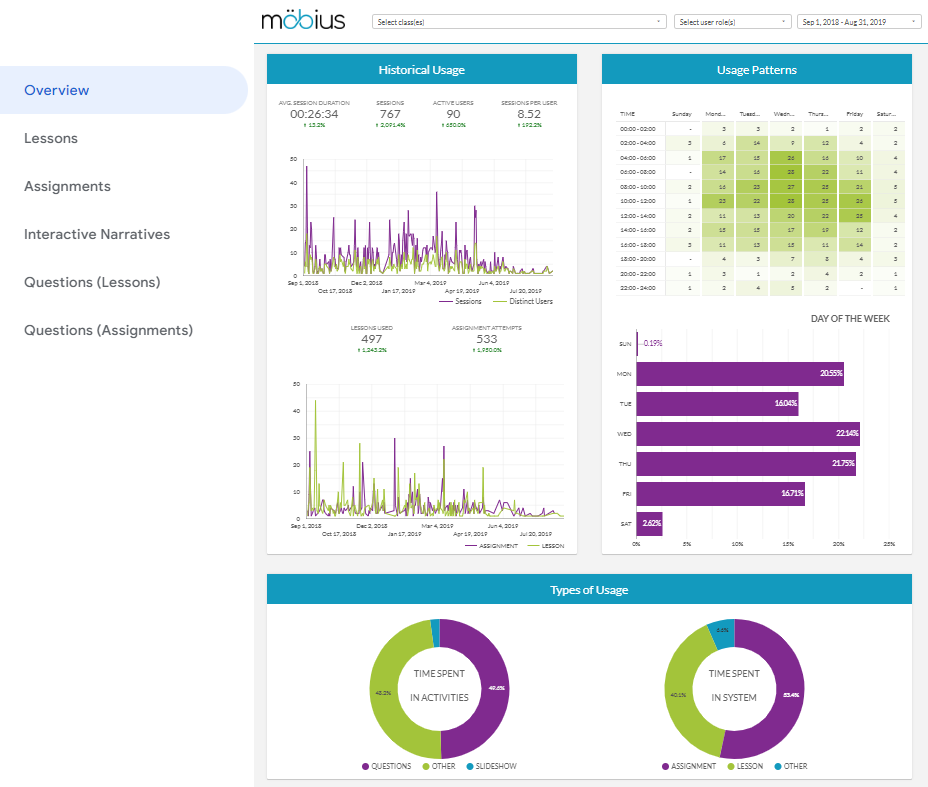Dr. Aron Pasieka—DigitalEd’s very own Data Scientist—sat down with me and walked me through all of the detailed analytical data that you can access when using Möbius and Möbius Grading, which I compiled into a four-part blog series for you!

These are pretty powerful insights that you won’t get from any other educational tool, and you can actually draw actionable conclusions from them even without being a data scientist yourself!
This PART III blog covers how you can explore a series of Möbius Analytics dashboards to understand student behavior and engagement patterns within your course, even when your course is offered asynchronously!
You might also want to check out:
-
- PART I: Evaluate the Performance of Your Questions (Möbius)
- PART II: Grade Reports for Student Overviews (Möbius)
- PART IV: Data Even From Paper-Based Grading (Möbius Grading)
If you’re curious about the differences between Möbius and Möbius Grading, check out DigitalEd MythBusters: Möbius VS Möbius Grading.
Möbius Analytics to understand the student experience
What is it for? Learning more about how your students are using Möbius and interacting with your content.
Why do I need it? To ensure that you’re offering your content in a way that works for your students.
Möbius Analytics gives you an extra set of eyes to see how your students are studying and learning!
With six detailed dashboards, Möbius Analytics reveals how your students are consuming your content:

This means you can ask questions like:
-
- When students are accessing your Möbius assignments?
- How long students are spending on a certain Möbius assignment?
- How long students are spending on a certain Möbius assignment question?
- How many times was a Möbius assignment question attempted?
Plus, since Möbius is designed for comprehensive course delivery, you can also investigate metrics for your lesson content, like observing how long students are spending on a specific page within a lesson.
These dashboards let you then answer questions with actionable takeaways like:
- Are your students feeling rewarded for using the content?
- In other words, are they actually working through all of the practice assignments that you’ve made available because the educational content gives them a sense of completion and accomplishment?
- Are your students finding value in the content you’ve made for them?
- In other words, because you can see metrics like how many times an algorithmic practice question is attempted, are students actually taking the time to engage with what you’ve made available to them?
- Is my content of high quality?
- In other words, because you can see metrics like how much time is spent on a specific practice assignment, are students actually taking the time to use what you’ve created to learn the concept?
- Is my content the right level of difficulty?
- In other words, because you can see metrics like how much time is spent on specific test questions, are students spending too much time on one of the questions which then compromises their performance on the rest of a timed test?
- Does my content need revising?
- In other words, because you can see how many times a specific practice question is attempted, are students working on that question 10X more than the others, meaning that you need to maybe break the associated lesson into smaller components or spend more time explaining it during a tutorial session?
You can even drill down to view specific timeframes and data cohorts relating to:
-
- Your entire institution
- A subset of classes within your institution
- A specific class within your institution
Möbius Analytics can get you back to teaching, enabling you to focus on what’s really needed by your students.
Now you’re ready for:
-
- PART IV: Data Even From Paper-Based Grading (Möbius Grading)
Or, go back and check out:

